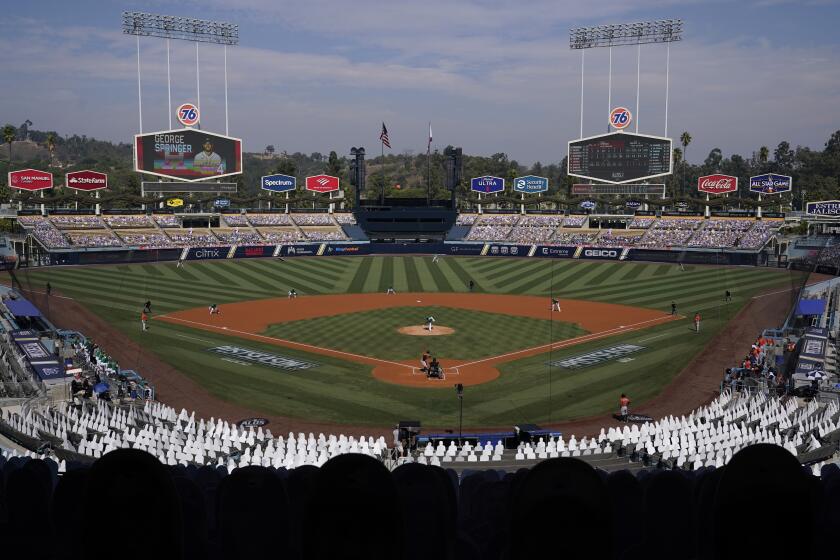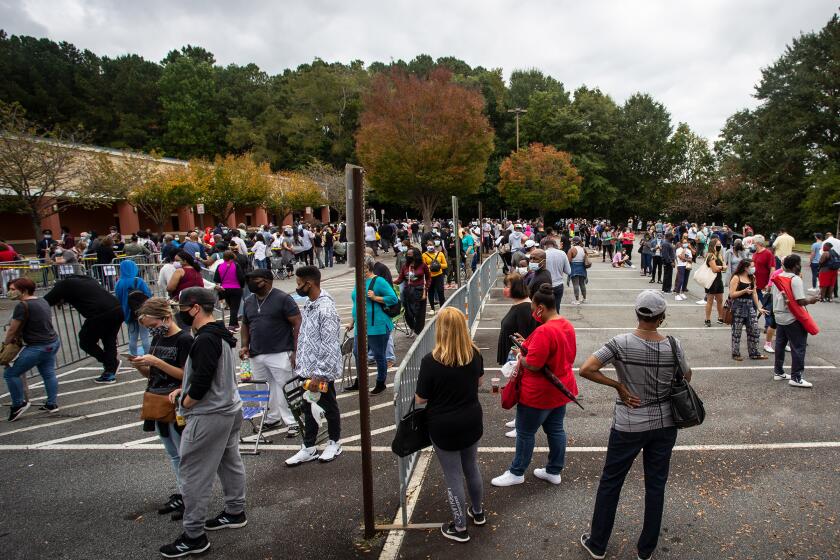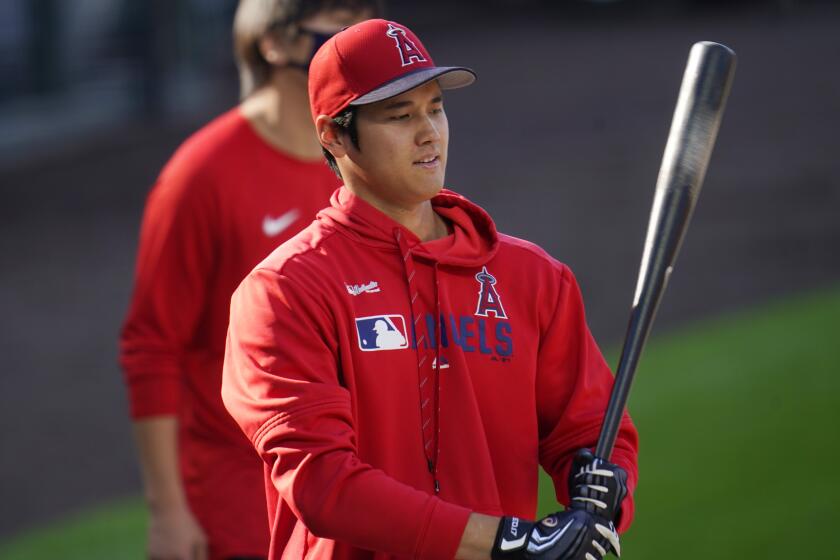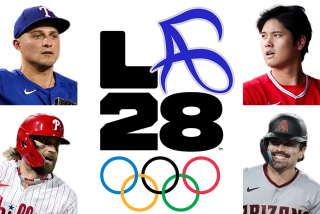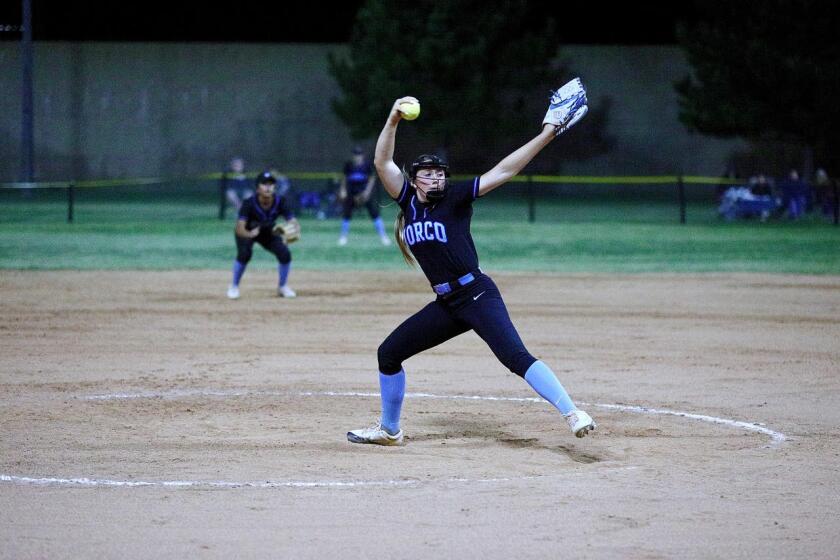Why MLB should consider moving the 2021 All-Star game from Atlanta
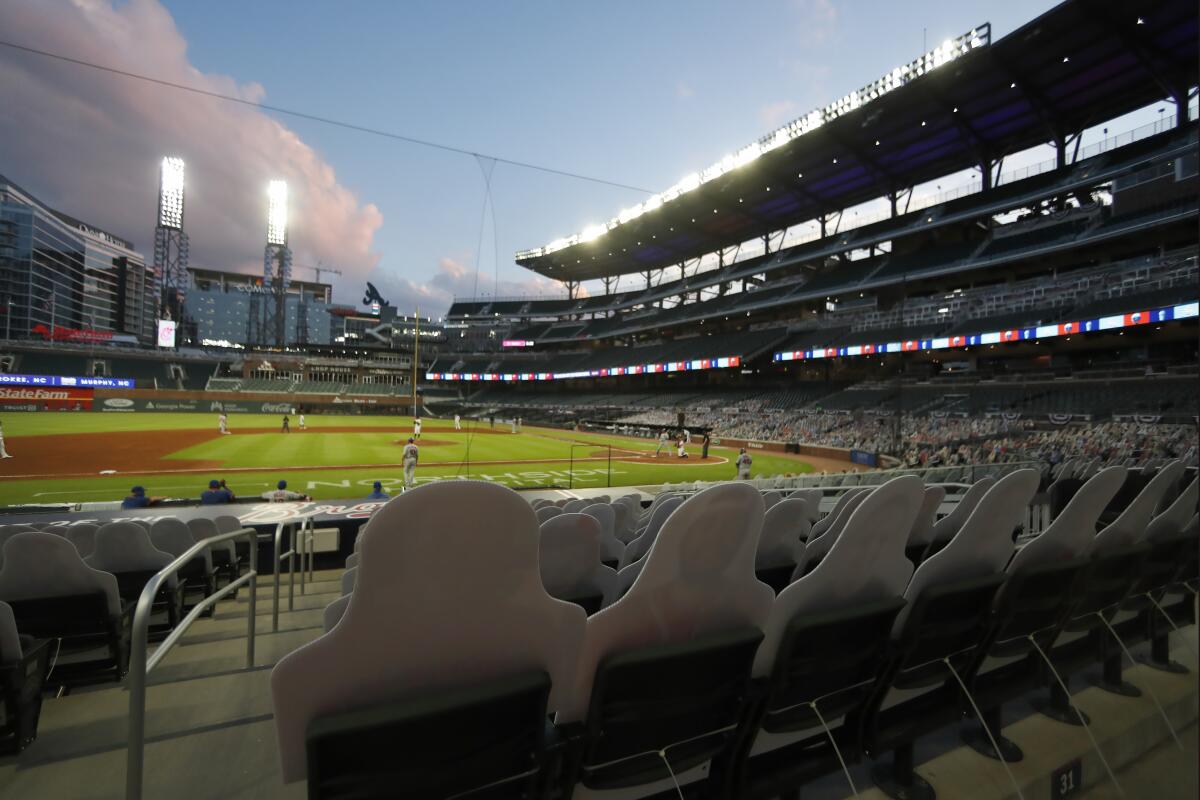
- Share via
These are the words of the only baseball player to have his number retired by every major league team: “The right of every American to first-class citizenship is the most important issue of our time.”
Jackie Robinson said that in 1969. That remains a vital issue today, and Major League Baseball ought to take a bold position in support of Robinson’s vision.
Not with a statement full of carefully crafted words, but with decisive action. If Georgia persists in pursuing laws that will make it harder to vote, and disproportionately so in Black communities, MLB should move the 2021 All-Star game out of Atlanta.
There was no vast fraud in the November election. President Trump’s attorney general said so. His election security chief said so, and his agency called the election “the most secure in history.” Georgia’s secretary of state said so.
But the relentlessly repeated lies about election fraud have led to a sinister bit of circular logic: First, there must have been fraud; second, people are talking about fraud; three, we need to tighten election security because people are talking about fraud.
Under the Orwellian guise of “election integrity,” legislators across America are working on bills that make it more difficult for people to vote. According to the Brennan Center for Justice at New York University, more than 250 such bills have been introduced in 43 state legislatures — and no state is considering more of these restrictive bills than Georgia.
“Many of these bills are reactionary to a three-month disinformation campaign,” said Brad Raffensperger, the Georgia secretary of state.
Single-game Dodgers tickets are expected to go on sale by the end of March, following the completion of the re-seating process for season-ticket holders.
Georgia legislators have not settled on a final plan. Among provisions most recently discussed: limiting in-person voting ahead of election day, limiting absentee voting, limiting the locations to drop off a completed ballot, and requiring additional layers of identification in order to cast a ballot.
“This is Jim Crow in a suit and a tie,” Aunna Dennis, executive director of Common Cause Georgia, told The Times.
Dennis said the data her group has studied show the effects of the proposed restrictions would have the greatest impact upon Black and other minority voters.
“This is definitely an attack on the voting freedoms and the gains we’ve made in the last 60 years,” she said.
Bud Selig, the former MLB commissioner, liked to say that baseball is a social institution with important social responsibilities. MLB should stand up for the right of every American to first-class citizenship, which includes the right to vote without undue restriction.
Georgia is no place for the naïve sentiment that politics and sports should not mix. After Sen. Kelly Loeffler, then an owner of the WNBA’s Atlanta Dream, expressed her opposition to that league’s embrace of what she called “the Black Lives Matter political movement,” the Dream players rallied around one of her election opponents, Rev. Raphael Warnock.
Corporations, especially Georgia-based businesses like Delta and Coca-Cola, respond by ramping up criticism of new voting restrictions in the state.
When the Dream players first campaigned for Warnock last August, he was polling at 9% and Loeffler at 26%. In January, Warnock defeated Loeffler in a runoff election.
In 1974, when Hank Aaron broke Babe Ruth’s home run record, Vin Scully had the call from Atlanta.
“What a marvelous moment for baseball,” Scully said. “What a marvelous moment for Atlanta and the state of Georgia. What a marvelous moment for the country and the world.
“A Black man is getting a standing ovation in the Deep South for breaking a record of an all-time baseball idol.”
Half a century later, Georgia lawmakers appear fine with a Black man hitting a home run for their team, less so with a Black man casting a ballot in their state.
Stacey Abrams, founder of Fair Fight Action, is among the community leaders pleading for corporate support.
“There should be no silence from the business community when anyone in power is trying to strip away the right to vote from the people,” Abrams said on a conference call this month.
After a summer of social protest last year, Major League Baseball partnered with the Civic Alliance, a group of major corporations united under the slogan, “We’re 100% In For Democracy.”
The league last year gave its employees Election Day off so they could vote and volunteer, encouraged teams to facilitate the use of ballparks as polling places, and supported voter education efforts across the country.
In a press release last September, Commissioner Rob Manfred said: “The right to vote is a pillar of American democracy, a privilege that we should all appreciate and exercise.”
It should follow, then, that Manfred and the league would publicly oppose efforts to restrict the right to vote. Perhaps some MLB owners might fear the wrath of the far right for, as Michael Jordan once said in explaining his famously apolitical persona: “Republicans buy sneakers too.”
But the newest MLB owner is LeBron James, who just bought a stake in the Boston Red Sox.
More than a Vote, an organization fronted by James, joined with the Dodgers in turning Dodger Stadium into a polling place last year. James himself narrated an advertisement this month as part of a “Protect Our Power” campaign.
“Look what we did,” James said in the ad. “Look what we made happen. What our voices made possible.
“And now, look what they’re trying to do to silence us. Using every trick in the book. And attacking democracy itself. Because they saw what we’re capable of. And they fear it.”
Angels two-way star Shohei Ohtani might hit on days he pitches. He might pitch every sixth day. He might hit the day after he pitches. It’s all on the table.
There would be nothing revolutionary about stripping Atlanta of a great sporting event in the interest of social justice. MLB declined to comment, but the NFL and NBA already have leveraged their power that way.
In 1990, Arizona voters rejected a proposal to make Martin Luther King Jr. Day a state holiday. The NFL responded by moving the 1993 Super Bowl from Tempe, Ariz., to the Rose Bowl in Pasadena. Voters later approved the holiday, and the NFL awarded the 1996 Super Bowl to Phoenix.
In 2016, after North Carolina adopted a law that directed transgender individuals to use the bathroom corresponding to the gender on their birth certificate, the NBA branded the law as discriminatory. The league moved its 2017 All-Star game from Charlotte to New Orleans. The law later was repealed, and the NBA awarded its 2019 All-Star game to Charlotte.
MLB bathes in the glow of Robinson, and rightfully so. Next year marks the 75th anniversary of Robinson breaking the color barrier in America’s major professional sports.
The league commemorates Jackie Robinson Day on April 15. Robinson might be celebrated for his Hall of Fame baseball career, but he also was a dedicated civil rights activist.
This year, there could be no better way for Robinson’s sport to honor him than this: If Georgia officials do not withdraw or reject the voter suppression bills, MLB will announce April 15 that it is withdrawing the 2021 All-Star game from Atlanta.
More to Read
Go beyond the scoreboard
Get the latest on L.A.'s teams in the daily Sports Report newsletter.
You may occasionally receive promotional content from the Los Angeles Times.

